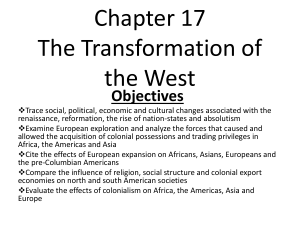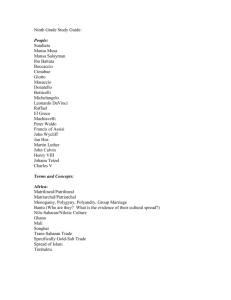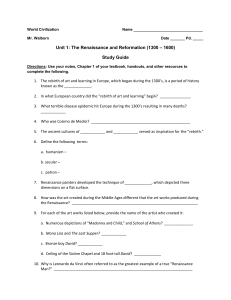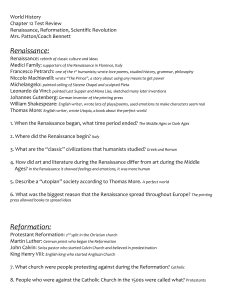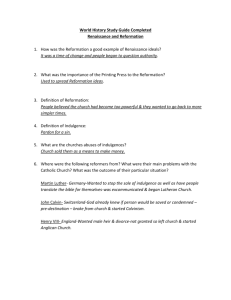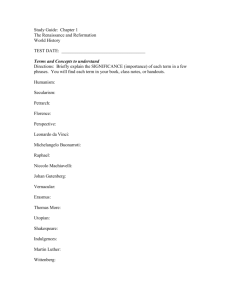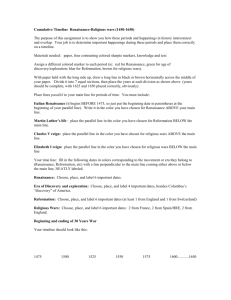Renaissance & Reformation Study Guide
advertisement
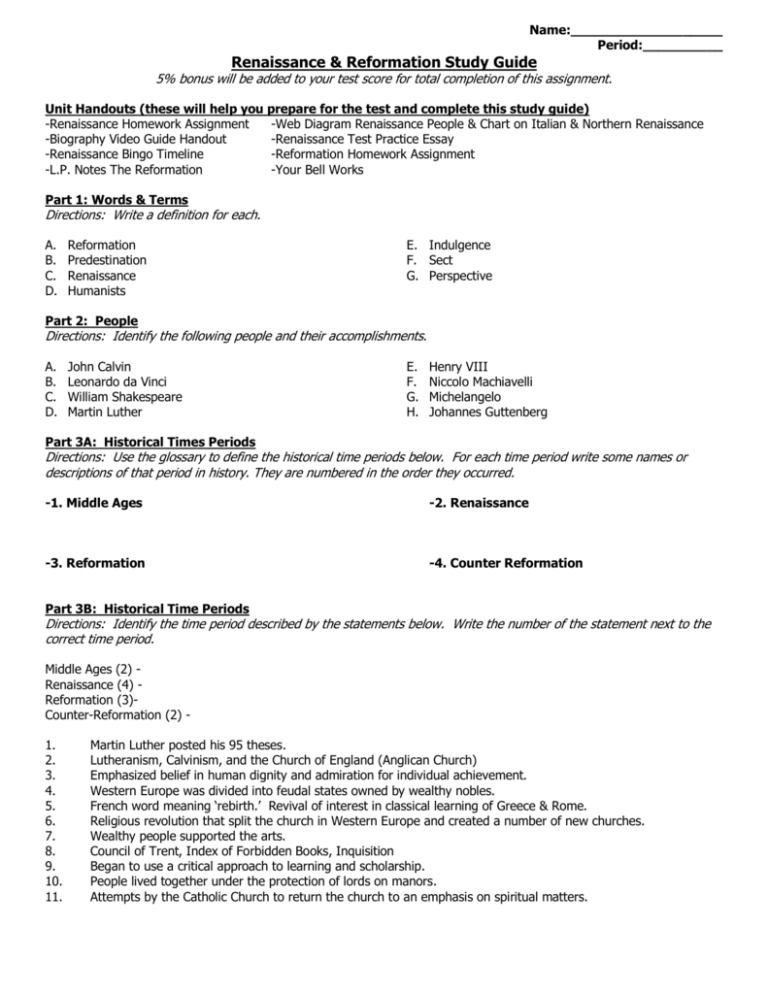
Name:___________________ Period:__________ Renaissance & Reformation Study Guide 5% bonus will be added to your test score for total completion of this assignment. Unit Handouts (these will help you prepare for the test and complete this study guide) ­Renaissance Homework Assignment ­Web Diagram Renaissance People & Chart on Italian & Northern Renaissance ­Biography Video Guide Handout ­Renaissance Test Practice Essay ­Renaissance Bingo Timeline ­Reformation Homework Assignment ­L.P. Notes The Reformation ­Your Bell Works Part 1: Words & Terms Directions: Write a definition for each. A. B. C. D. Reformation Predestination Renaissance Humanists E. Indulgence F. Sect G. Perspective Part 2: People Directions: Identify the following people and their accomplishments. A. B. C. D. John Calvin Leonardo da Vinci William Shakespeare Martin Luther E. F. G. H. Henry VIII Niccolo Machiavelli Michelangelo Johannes Guttenberg Part 3A: Historical Times Periods Directions: Use the glossary to define the historical time periods below. For each time period write some names or descriptions of that period in history. They are numbered in the order they occurred. ­1. Middle Ages ­2. Renaissance ­3. Reformation ­4. Counter Reformation Part 3B: Historical Time Periods Directions: Identify the time period described by the statements below. Write the number of the statement next to the correct time period. Middle Ages (2) ­ Renaissance (4) ­ Reformation (3)­ Counter­Reformation (2) ­ 1. 2. 3. 4. 5. 6. 7. 8. 9. 10. 11. Martin Luther posted his 95 theses. Lutheranism, Calvinism, and the Church of England (Anglican Church) Emphasized belief in human dignity and admiration for individual achievement. Western Europe was divided into feudal states owned by wealthy nobles. French word meaning ‘rebirth.’ Revival of interest in classical learning of Greece & Rome. Religious revolution that split the church in Western Europe and created a number of new churches. Wealthy people supported the arts. Council of Trent, Index of Forbidden Books, Inquisition Began to use a critical approach to learning and scholarship. People lived together under the protection of lords on manors. Attempts by the Catholic Church to return the church to an emphasis on spiritual matters. TIMELINE Directions: Put the following events in the order in which they occurred. Write the statements below in correct order. (hint: what time period did these occur in? what order did those time periods go?) A. Pythagoras develops his famed theorem. B. The Catholic Church bans the sale of indulgences. C. The printing press is invented. D. Martin Luther posts the 95 Thesis on the Wittenberg door. E. The Crusades take place increasing trade to the East. 1. ________________________________________________________________________________________________________ 2. ________________________________________________________________________________________________________ 3. ________________________________________________________________________________________________________ 4. ________________________________________________________________________________________________________ 5. ________________________________________________________________________________________________________ Part 3: Protestant or Catholic Directions: For each statement below mark P if it is true of a Protestant belief or C if it is true of a Catholic belief. _____ Both faith and good works are required of a good Christian for salvation. _____ An inner faith in God is all that is needed to achieve salvation. _____ Every Christian can communicate directly with God. _____ A person should attend church, go on pilgrimages, and give to the poor. _____ People need priests and other clergymen to help them communicate with God. _____ The Bible should be considered the sole religious authority, not what the church tells you to believe. _____ Elaborate church rituals have no meaningful purpose. _____ The pope is wiser and holier than other Christians. _____ The selling of indulgences is wrong. _____ Martin Luther and John Calvin are heretics. Part 5: Focus Questions Directions: Answer the following focus questions. 1. What are 3 reasons the Renaissance began in Italy? 2. Who were the humanists? What did they specialize in during the Renaissance? 3. How did medieval scholars and Renaissance scholars differ in what they studied? 4. How did medieval and Renaissance art differ? 5. Where did the Reformation begin? How? 6. What did Martin Luther protest against in his 95 Theses? 7. How did the views of John Calvin differ from those of the Catholic Church? 8. Describe ways the Catholic Church tried to reform during the Counter­Reformation.

